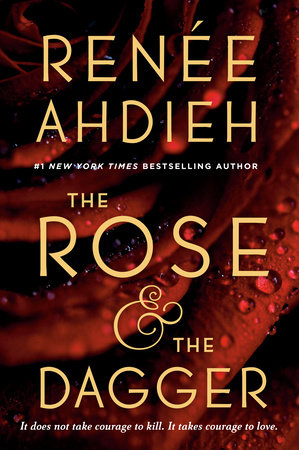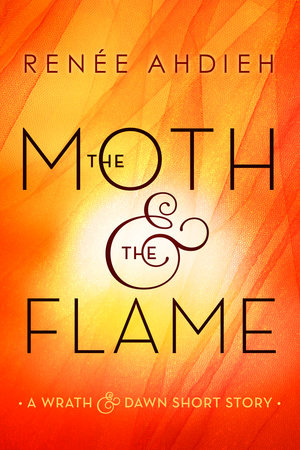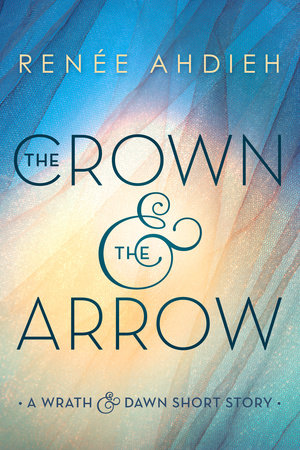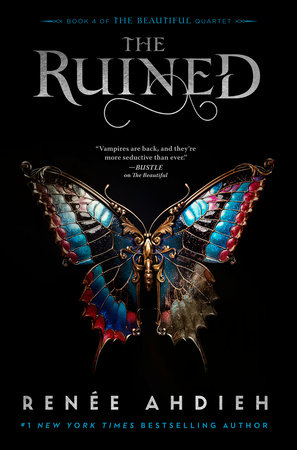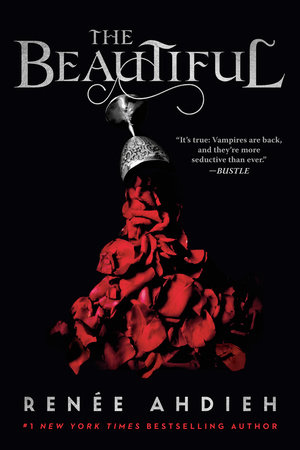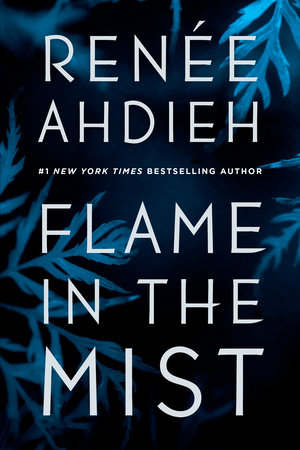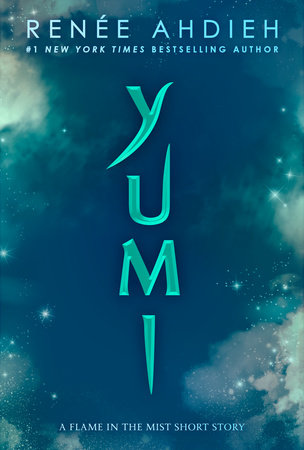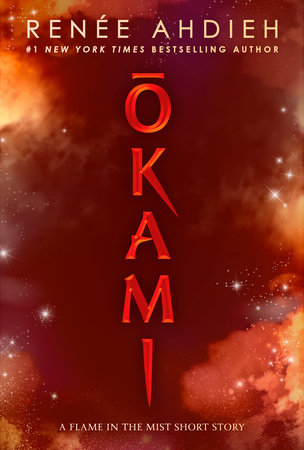
The Wrath & the Dawn
Part of: The Wrath and the Dawn
Ebook
$9.99
A sumptuous and epically told love story inspired by A Thousand and One Nights
Every dawn brings horror to a different family in a land ruled by a killer. Khalid, the eighteen-year-old Caliph of Khorasan, takes a new bride each night only to have her executed at sunrise. So it is a suspicious surprise when sixteen-year-old Shahrzad volunteers to marry Khalid. But she does so with a clever plan to stay alive and exact revenge on the Caliph for the murder of her best friend and countless other girls. Shazi’s wit and will, indeed, get her through to the dawn that no others have seen, but with a catch . . . she’s falling in love with the very boy who killed her dearest friend.
She discovers that the murderous boy-king is not all that he seems and neither are the deaths of so many girls. Shazi is determined to uncover the reason for the murders and to break the cycle once and for all.
- Pages: 416 Pages
- Series: The Wrath and the Dawn
- Publisher: Penguin Young Readers Group
- Imprint: Nancy Paulsen Books
- ISBN: 9780698185890
An Excerpt From
The Wrath & the Dawn
I once had a thousand desires,
But in my one desire to know you,
all else melted away.
Jalal al-Din Rumi
IT WOULD NOT BE A WELCOME DAWN.
Already the sky told this story, with its sad halo of silver beckoning from beyond the horizon.
A young man stood alongside his father on the rooftop terrace of the marble palace. They watched the pale light of the early morning sun push back the darkness with slow, careful deliberation.
“Where is he?” the young man asked.
His father did not look his way. “He has not left his chamber since he gave the order.”
The young man ran a hand through his wavy hair, exhaling all the while. “There will be riots in the city streets for this.”
“And you will put them to rout, in short order.” It was a terse response, still made to a somber stretch of light.
“In short order? Do you not think a mother and father, regardless of birth or rank, will fight to avenge their child?”
Finally, the father faced his son. His eyes were drawn and sunken, as though a weight tugged at them from within. “They will fight. They should fight. And you will ensure it amounts to nothing. You will do your duty to your king. Do you understand?”
The young man paused. “I understand.”
“General al-Khoury?”
His father turned toward the soldier standing behind them. “Yes?”
“It is done.”
His father nodded, and the soldier left.
Again, the two men stared up at the sky.
Waiting.
A drop of rain struck the arid surface beneath their feet, disappearing into the tan stone. Another plinked against the iron railing before it slid its way into nothingness.
Soon, rain was falling around them at a steady pace.
“There is your proof,” the general said, his voice laden with quiet anguish.
The young man did not respond right away.
“He cannot withstand this, Father.”
“He can. He is strong.”
“You have never understood Khalid. It is not about strength. It is about substance. What follows will destroy all that remains of his, leaving behind a husk—a shadow of what he once was.”
The general winced. “Do you think I wanted this for him? I would drown in my own blood to prevent this. But we have no choice.”
The young man shook his head and wiped the rain from beneath his chin.
“I refuse to believe that.”
“Jalal—”
“There must be another way.” With that, the young man turned from the railing and vanished down the staircase.
Throughout the city, long-dry wells began to fill. Cracked, sunbaked cisterns shimmered with pools of hope, and the people of Rey awoke to a new joy. They raced into the streets, angling their smiling faces to the sky.
Not knowing the price.
And, deep within the palace of marble and stone, a boy of eighteen sat alone before a table of polished ebony . . .
Listening to the rain.
The only light in the room reflected back in his amber eyes.
A light beset by the dark.
He braced his elbows on his knees and made a crown of his hands about his brow. Then he shuttered his gaze, and the words echoed around him, filling his ears with the promise of a life rooted in the past.
Of a life atoning for his sins.
One hundred lives for the one you took. One life to one dawn. Should you fail but a single morn, I shall take from you your dreams. I shall take from you your city.
And I shall take from you these lives, a thousandfold.
THEY WERE NOT GENTLE. AND WHY SHOULD THEY BE?
After all, they did not expect her to live past the next morning.
The hands that tugged ivory combs through Shahrzad’s waist-length hair and scrubbed sandalwood paste on her bronze arms did so with a brutal kind of detachment.
Shahrzad watched one young servant girl dust her bare shoulders with flakes of gold that caught the light from the setting sun.
A breeze gusted along the gossamer curtains lining the walls of the chamber. The sweet scent of citrus blossoms wafted through the carved wooden screens leading to the terrace, whispering of a freedom now beyond reach.
This was my choice. Remember Shiva.
“I don’t wear necklaces,” Shahrzad said when another girl began to fasten a jewel-encrusted behemoth around her throat.
“It is a gift from the caliph. You must wear it, my lady.”
Shahrzad stared down at the slight girl in amused disbelief. “And if I don’t? Will he kill me?”
“Please, my lady, I—”
Shahrzad sighed. “I suppose now is not the time to make this point.”
“Yes, my lady.”
“My name is Shahrzad.”
“I know, my lady.” The girl glanced away in discomfort before turning to assist with Shahrzad’s gilded mantle. As the two young women eased the weighty garment onto her glittering shoulders, Shahrzad studied the finished product in the mirror before her.
Her midnight tresses gleamed like polished obsidian, and her hazel eyes were edged in alternating strokes of black kohl and liquid gold. At the center of her brow hung a teardrop ruby the size of her thumb; its mate dangled from a thin chain around her bare waist, grazing the silk sash of her trowsers. The mantle itself was pale damask and threaded with silver and gold in an intricate pattern that grew ever chaotic as it flared by her feet.
I look like a gilded peacock.
“Do they all look this ridiculous?” Shahrzad asked.
Again, the two young women averted their gazes with unease.
I’m sure Shiva didn’t look this ridiculous . . .
Shahrzad’s expression hardened.
Shiva would have looked beautiful. Beautiful and strong.
Her fingernails dug into her palms; tiny crescents of steely resolve.
At the sound of a quiet knock at the door, three heads turned—their collective breaths bated.
In spite of her newfound mettle, Shahrzad’s heart began to pound.
“May I come in?” The soft voice of her father broke through the silence, pleading and laced in tacit apology.
Shahrzad exhaled slowly . . . carefully.
“Baba, what are you doing here?” Her words were patient, yet wary.
Jahandar al-Khayzuran shuffled into the chamber. His beard and temples were streaked with grey, and the myriad colors in his hazel eyes shimmered and shifted like the sea in the midst of a storm.
In his hand was a single budding rose, its center leached of color, and the tips of its petals tinged a beautiful, blushing mauve.
“Where is Irsa?” Shahrzad asked, alarm seeping into her tone.
Her father smiled sadly. “She is at home. I did not allow her to come with me, though she fought and raged until the last possible moment.”
At least in this he has not ignored my wishes.
“You should be with her. She needs you tonight. Please do this for me, Baba? Do as we discussed?” She reached out and took his free hand, squeezing tightly, beseeching him in her grip to follow the plans she had laid out in the days before.
“I—I can’t, my child.” Jahandar lowered his head, a sob rising in his chest, his thin shoulders trembling with grief. “Shahrzad—”
“Be strong. For Irsa. I promise you, everything will be fine.” Shahrzad raised her palm to his weathered face and brushed away the smattering of tears from his cheek.
“I cannot. The thought that this may be your last sunset—”
“It will not be the last. I will see tomorrow’s sunset. This I swear to you.”
Jahandar nodded, his misery nowhere close to mollified. He held out the rose in his hand. “The last from my garden; it has not yet bloomed fully, but I wanted to give you one remembrance of home.”
She smiled as she reached for it, the love between them far past mere gratitude, but he stopped her. When she realized the reason, she began to protest.
“No. At least in this, I might do something for you,” he muttered, almost to himself. He stared at the rose, his brow furrowed and his mouth drawn. One servant girl coughed in her fist while the other looked to the floor.
Shahrzad waited patiently. Knowingly.
The rose started to unfurl. Its petals twisted open, prodded to life by an invisible hand. As it expanded, a delicious perfume filled the space between them, sweet and perfect for an instant . . . but soon, it became overpowering. Cloying. The edges of the flower changed from a brilliant, deep pink to a shadowy rust in the blink of an eye.
And then the flower began to wither and die.
Dismayed, Jahandar watched its dried petals wilt to the white marble at their feet.
“I—I’m sorry, Shahrzad,” he cried.
“It doesn’t matter. I will never forget how beautiful it was for that moment, Baba.” She wrapped her arms around his neck and pulled him close. By his ear, in a voice so low only he could hear, she said, “Go to Tariq, as you promised. Take Irsa and go.”
He nodded, his eyes shimmering once more. “I love you, my child.”
“And I love you. I will keep my promises. All of them.”
Overcome, Jahandar blinked down at his elder daughter in silence.
This time, the knock at the door demanded attention rather than requested it.
Shahrzad’s forehead whipped back in its direction, the bloodred ruby swinging in tandem. She squared her shoulders and lifted her pointed chin.
Jahandar stood to the side, covering his face with his hands, as his daughter marched forward.
“I’m sorry—so very sorry,” she whispered to him before striding across the threshold to follow the contingent of guards leading the processional. Jahandar slid to his knees and sobbed as Shahrzad turned the corner and disappeared.
With her father’s grief resounding through the halls, Shahrzad’s feet refused to carry her but a few steps down the cavernous corridors of the palace. She halted, her knees shaking beneath the thin silk of her voluminous sirwal trowsers.
“My lady?” one of the guards prompted in a bored tone.
“He can wait,” Shahrzad gasped.
The guards exchanged glances.
Her own tears threatening to blaze a telltale trail down her cheeks, Shahrzad pressed a hand to her chest. Unwittingly, her fingertips brushed the edge of the thick gold necklace clasped around her throat, festooned with gems of outlandish size and untold variety. It felt heavy . . . stifling. Like a bejeweled fetter. She allowed her fingers to wrap around the offending instrument, thinking for a moment to rip it from her body.
The rage was comforting. A friendly reminder.
Shiva.
Her dearest friend. Her closest confidante.
She curled her toes within their sandals of braided bullion and threw back her shoulders once more. Without a word, she resumed her march.
Again, the guards looked to one another for an instant.
When they reached the massive double doors leading into the throne room, Shahrzad realized her heart was racing at twice its normal speed. The doors swung open with a distended groan, and she focused on her target, ignoring all else around her.
At the very end of the immense space stood Khalid Ibn al-Rashid, the Caliph of Khorasan.
The King of Kings.
The monster from my nightmares.
With every step she took, Shahrzad felt the hate rise in her blood, along with the clarity of purpose. She stared at him, her eyes never wavering. His proud carriage stood out amongst the men in his retinue, and details began to emerge the closer she drew to his side.
He was tall and trim, with the build of a young man proficient in warfare. His dark hair was straight and styled in a manner suggesting a desire for order in all things.
As she strode onto the dais, she looked up at him, refusing to balk, even in the face of her king.
His thick eyebrows raised a fraction. They framed eyes so pale a shade of brown they appeared amber in certain flashes of light, like those of a tiger. His profile was an artist’s study in angles, and he remained motionless as he returned her watchful scrutiny.
A face that cut; a gaze that pierced.
He reached a hand out to her.
Just as she extended her palm to grasp it, she remembered to bow.
The wrath seethed below the surface, bringing a flush to her cheeks.
When she met his eyes again, he blinked once.
“Wife.” He nodded.
“My king.”
I will live to see tomorrow’s sunset. Make no mistake. I swear I will live to see as many sunsets as it takes.
And I will kill you.
With my own hands.
THE FALCON DRIFTED THROUGH THE BLEARING MID-afternoon sky, its wings held aloft on a passing sigh of wind and its eyes scanning the underbrush below.
At fleeting signs of movement, the raptor tucked its wings against its body and hurtled toward the dirt in a blur of blue-grey feathers and flashing talons.
The mass of fur, screeching and scurrying through the underbrush, had no chance of escape. Soon, the sound of clattering hooves drew near, a swirl of sand curling in its wake.
The two riders paused a respectful distance from the falcon and her kill.
With the sun at his back, the first rider, sitting astride a gleaming, dark bay al-Khamsa stallion, extended his left arm and whistled, low and soft.
The falcon twisted his way, her yellow-rimmed eyes narrowing. Then she took to the air once more and landed with her talons firmly embedded in the leather mankalah cuff bound from the rider’s wrist to his elbow.
“Curse you, Zoraya. I lost another bet,” the second rider groaned to the bird.
The falconer grinned at Rahim, his friend since childhood. “Stop complaining. It’s not her fault you’re incapable of learning a single lesson.”
“You’re lucky I’m such a fool. Who else would stomach your company for so long, Tariq?”
Tariq laughed under his breath. “In that case, perhaps I should stop lying to your mother about how smart you’ve become.”
“Of course. Have I ever lied to yours?”
“Ingrate. Get down and collect her kill.”
“I’m not your servant. You do it.”
“Fine. Hold this.” Tariq stretched out his forearm, with Zoraya still waiting patiently on her perch. When the falcon realized she was being passed along to Rahim, she ruffled her feathers and screeched in protest.
Rahim reared back with alarm. “That godforsaken bird hates me.”
“Because she’s a good judge of character.” Tariq smiled.
“With a temper for the ages,” Rahim grumbled. “Honestly, she’s worse than Shazi.”
“Another girl with excellent taste.”
Rahim rolled his eyes. “A bit self-serving in that assessment, don’t you think? Considering the one thing they have in common is you.”
“Reducing Shahrzad al-Khayzuran to such a notion might be the reason you’re always on the receiving end of her temper. I assure you, Zoraya and Shazi have a great deal more in common than me. Now, stop wasting time and get down from that blasted roan so we can go home.”
Under continued grumblings, Rahim dismounted from his grey Akhal-Teke—her mane shining like polished pewter in the desert sun.
Tariq’s eyes skimmed the stretch of sand and dry brushwood along the horizon. Blistering waves of heat rose from a sea of umber and adobe, rippling into patches of blue and white across the sky.
With Zoraya’s catch now stowed in the leather pouch affixed to his saddle, Rahim swung back onto his horse, employing the grace of a young nobleman trained in the art since boyhood.
“As to the earlier bet regarding the bird . . .” Rahim trailed off.
Tariq groaned when he saw the determined look on Rahim’s face. “No.”
“Because you know you’ll lose.”
“You’re a better rider than I am.”
“You have a better horse. Your father is an emir. Plus, I already lost one bet today. Give me a chance to even the field,” Rahim insisted.
“How long are we going to play these games?”
“Until I beat you. At every one of them.”
“Then we’ll be playing forever,” Tariq joked.
“Bastard.” Rahim suppressed a grin as he gripped his reins. “For that, I won’t even try to play fair.” He dug his heels into the mare before taking off in the opposite direction.
“Fool.” Tariq laughed as he released Zoraya into the clouds and leaned over the neck of his stallion. At the click of his tongue, the horse shook out its mane and snorted. Tariq pulled on the reins, and the Arabian reared onto its massive hooves before launching across the sand, its powerful legs kicking up a vortex of dust and debris.
Tariq’s white rida’ billowed behind him, the hood threatening to blow back in spite of the leather band holding it in place.
As they rounded the final dune, a walled fortress of tan stone and grey mortar rose from the sands, its vaulted turrets capped in spirals of copper tinged by the turquoise patina of age.
“The emir’s son approaches!” a sentry cried out as Rahim and Tariq neared the back gates, which swung open with barely a moment to spare. Servants and laborers scrambled out of their path as Rahim barreled past the still-screeching iron with Tariq on his heels. A basket of persimmons crashed to the ground, its contents rolling across the expanse before a grousing old man bent forward, struggling to collect the wayward orange fruit.
Oblivious to the chaos they had wrought, the two young noblemen reined in their horses near the center of the sprawling courtyard.
“How does it feel—being bested by a fool?” Rahim taunted, his dark blue eyes bright.
One side of Tariq’s mouth rose with amusement before he swung down from the saddle and knocked back the hood of his rida’. He ran a hand through his unruly tangle of wavy hair. Grains of sand fell into his face, and he blinked hard to fend off their attack.
The sound of Rahim’s choked laughter rang out from behind him.
Tariq opened his eyes.
The servant girl standing before Tariq looked away in haste, her cheeks blooming with color. The tray she held with two silver tumblers of water began to shake.
“Thank you.” Tariq smiled as he reached for one.
Her blush deepened, and the rattling grew worse.
Rahim lumbered closer. He took his own tumbler and nodded to the girl before she twisted around and ran as fast as her legs could carry her.
Tariq shoved him. Hard. “You oaf.”
“I believe that poor girl is half in love with you. After another wretched display of horsemanship, you should be extra grateful to the hand of fate that dealt you those looks.”
Tariq ignored him and swiveled to take in the sights of the courtyard. To his right, he noticed the elderly servant stooping above a gaggle of persimmons scattered across the granite at his feet. Tariq glided forward and bent on one knee to help the old man place the fruit in a basket.
“Thank you, sahib.” The man bowed his head and touched the fingertips of his right hand to his forehead in a gesture of respect.
Tariq’s eyes softened, their colors flickering in the shade. Their bright silver centers blended into rings of darkest ash, with black lashes that fanned against the soft skin of his eyelids. His brow had an air of severity that faded with the ready appearance of his smile. A day-old beard shadowed the square line of his jaw, further accentuating its finely wrought symmetry.
Tariq nodded at the elderly man and returned the customary gesture.
Above them, Zoraya’s cry resounded from the sky, demanding immediate attention. Tariq shook his head in mock irritation and whistled for her. She swooped down with a wild shriek that cleared another portion of the courtyard. Again, she landed on Tariq’s outstretched mankalah and preened as he carried her to her mews to feed her.
“Do you not find the bird a bit . . . spoiled?” Rahim studied the falcon as she guzzled an entire strip of dried meat without pausing for breath.
“She’s the best hunter in the kingdom.”
“Nevertheless, I’m convinced that accursed bird could get away with murder. Is that your intent?”
Before Tariq could retort, one of his father’s closest advisors appeared in the nearby archway to the vestibule.
“Sahib? The emir requests your presence.”
Tariq’s eyebrows drew together. “Is something wrong?”
“A messenger arrived from Rey not long ago.”
“Is that all?” Rahim harrumphed. “A letter from Shazi? Hardly worthy of a formal audience.”
Tariq continued studying the advisor, taking in the deep lines marring his forehead and the tight weave of his interlaced fingers. “What happened?”
The advisor hedged. “Please, sahib. Come with me.”
Rahim followed Tariq and the advisor into the columned marble vestibule and past the open-air gallery, with its tiled fountain of mosaic glass. Sparkling water fell in a steady stream from the mouth of a lion constructed of gilt bronze.
They entered the main hall to find Nasir al-Ziyad, emir of the fourth-richest stronghold in Khorasan, sitting with his wife at a low table. Their dinner lay before them, untouched.
It was obvious Tariq’s mother had been crying.
He stopped short at the sight. “Father?”
The emir exhaled and raised his troubled eyes to meet his son.
“Tariq, we received a letter from Rey this afternoon. From Shahrzad.”
“Give it to me.” The request was soft. Sharp.
“It was addressed to me. There is a portion of it that was meant for you, but the—”
Tariq’s mother burst into tears. “How could this happen?”
“What happened?” Tariq demanded, his voice rising. “Give me the letter.”
“It’s too late. There’s nothing you can do,” the emir sighed.
“First Shiva. Then, lost in her grief, my sister took her own—” She shuddered. “And now Shahrzad? How could this happen? Why?” Tariq’s mother wept.
Tariq froze.
“You know why,” the emir rasped in a low tone. “It’s because of Shiva that she did this. For Shiva. For all of us.”
At that, Tariq’s mother rose from the table and fled, her sobs growing louder with every footstep.
“Oh, God. Shazi. What did you do?” Rahim whispered.
Tariq remained motionless, his expression blank and inscrutable.
The emir stood and moved toward his son. “Son, you—”
“Give me the letter,” Tariq repeated.
With grim resignation, the emir relinquished the scroll.
Shahrzad’s familiar scrawl swam across the page, just as imperious and heavy-handed as usual. Tariq stopped reading when she began addressing him directly. The apology. The words of regret for her betrayal. The gratitude for his understanding.
No more. He couldn’t stand it. Not from her.
The edge of the scroll crumpled in his fist.
“There is nothing you can do,” the emir reiterated. “The wedding—it’s today. If she succeeds . . . if she—”
“Don’t say it, Father. I beg you.”
“It must be said. These truths, no matter how harsh, must be said. We must deal with this, as a family. Your aunt and uncle never dealt with the loss of Shiva, and look what came of their daughter’s death.”
Tariq’s eyes closed.
“Even if Shahrzad survives, there is nothing we can do. It is finished. We must accept this, however difficult it may seem. I know how you feel about her; I fully understand. It will take time. But you will realize you can find happiness with someone else—that there are other young women in the world. In time, you will see,” the emir said.
“There’s no need.”
“Excuse me?”
“I already understand. Fully.”
The emir eyed his son with surprise.
“I understand your points. All of them. Now I need you to understand mine. I know there are other women in the world. I know it’s possible for me to find a measure of happiness with another girl. Given time, I suppose anything may happen.”
The emir nodded. “Good. It’s for the best, Tariq.”
Rahim stared, dumbfounded.
Tariq continued, the silver in his eyes flashing. “But understand this: no matter how many perfect young women you put in my path, there is only one Shahrzad.” At that, he cast the scroll to the floor and whirled on his heel, slamming his palms into the doors to thrust them aside.
Rahim exchanged a thoughtful look with the emir before following Tariq. They retraced their steps into the courtyard, and Tariq signaled for the horses. Rahim did not speak until both mounts were brought before them.
“What’s the plan?” he asked gently. “Do you even have one?”
Tariq paused. “You don’t have to come with me.”
“And now who’s the fool? Are you the only one who loves Shazi? Who loved Shiva? I may not be blood, but they will always be my family.”
Tariq turned to his friend. “Thank you, Rahim-jan.”
The taller, lankier boy smiled down at Tariq. “Don’t thank me yet. We still need a plan. Tell me, what are you going to do?” Rahim hesitated. “Is there anything you can do?”
Tariq’s jaw tightened. “As long as the ruler of Khorasan draws breath, there is always something I can do . . .” His left hand dropped to the hilt of the elegantly curved sword at his hip.
“What I do best.”
SHAHRZAD SAT ALONE IN HER CHAMBER, IN THE CENTER of a platformed cushion piled high with pillows covered in vibrant fabrics. Surrounding the bed was a thin veil of spider-silk, blowing with eerie leisure at the slightest disturbance. Her knees were drawn to her chest; her fingers were laced across her ankles.
And her hazel eyes were trained on the doors.
She had stayed in this position for the better part of the night. Each time she tried to venture from the spot, her nerves threatened to overcome her.
Where is he?
She exhaled loudly and clasped her hands even tighter above her feet.
Soon, the panic she had been fighting for the last hour began to bear down on her like a hammer on an ironsmith’s anvil.
What if he doesn’t come to see me tonight?
“Oh, God,” she murmured, breaking through the stillness.
Then I lied to everyone. I broke every last promise.
Shahrzad shook her head. Her heartbeat rose in her ears as each breath became more labored.
I don’t want to die.
These macabre thoughts rubbed at the edges of her composure, pushing her down into the fathomless realms of terror—a terror she’d managed to keep at bay, thus far.
How will Baba survive if I’m killed? And Irsa?
Tariq.
“Stop it!” Her words echoed into the yawning darkness. Foolish, but she needed something—anything—to fill the torturous silence with sound, if but for an instant.
She pressed her hands to her temples and willed the terror back . . .
Back inside the steel-encased enclosure of her heart.
And then the doors swung open with a low creak.
Shahrzad dropped her palms to the soft cushion at her sides.
A servant stepped through, clutching tapers of aloewood and ambergris, which gave off a faint perfume and a delicate light; after a beat, a girl bearing a tray of food and wine followed. The servants placed their wares throughout the room and left without a glance in Shahrzad’s direction.
A moment later, the Caliph of Khorasan appeared at the threshold.
He waited, as if considering something, before entering the chamber and pushing the doors shut.
In the pale glow emitting from the candles, his tiger-eyes seemed even more calculating and remote. The lines of his face fell into shadow as he turned from the light, sharpening the bladed hollows of his features.
An immovable countenance. Cold and forbidding.
Shahrzad threaded her fingers beneath her knees.
“I’m told your father served under mine as one of his viziers.” His voice was low and unassuming. Almost . . . kind.
“Yes, sayyidi. He was an advisor to your father.”
“And he works as a custodian now.”
“Yes, sayyidi. Of ancient texts.”
He faced her. “Quite a change in position.”
Shahrzad bit back irritation. “Perhaps. He wasn’t a very high-ranking vizier.”
“I see.”
You see nothing.
She returned his gaze, hoping the mosaic of color in her eyes hid the thoughts running rampant behind them.
“Why did you volunteer, Shahrzad al-Khayzuran?”
She did not answer.
He continued. “What compelled you to do something so foolish?”
“Excuse me?”
“Perhaps it was the lure of marrying a king. Or the vain hope you might be the one to stay the course and win the heart of a monster.” He spoke without emotion, watching her intently.
Shahrzad’s pulse jumped to a martial beat. “I don’t suffer those delusions, sayyidi.”
“Then why did you volunteer? Why are you willing to throw away your life at seventeen?”
“I’m sixteen.” She cut her eyes. “And I don’t see why it matters.”
“Answer me.”
“No.”
He paused. “You realize you could die for that.”
The grip of her fingers tightened almost painfully. “I’m not surprised to hear that, sayyidi. But, if you truly want answers, killing me won’t help in the endeavor.”
A spark of something flashed across his face, lingering at the edges of his lips. It was gone too quickly to offer anything of significance.
“I suppose not.” He stopped, again in seeming consideration. She could see him withdrawing, a veil falling over the harsh angles of his profile.
No.
Shahrzad rose from the bed and took a step toward him.
When he glanced back at her, she moved closer.
“I told you. Do not think you will be the one to break the cycle.”
Shahrzad gritted her teeth. “And I told you. I don’t suffer delusions. On any account.”
She continued advancing until she stood but an arm’s length from him, her resolve unwavering.
He locked upon her face. “Your life is already forfeit. I do not expect . . . more than that.”
In response, Shahrzad reached up and began to unfasten the bejeweled necklace still hanging about her throat.
“No.” He caught her hand. “Leave it.”
He hesitated before shifting his fingers to the nape of her neck.
At this disturbingly familiar touch, Shahrzad fought the urge to pull back in disgust and strike out at him with all the pain and rage she possessed.
Don’t be foolish. There will only be one chance. Don’t waste it.
This boy-king, this murderer . . . she would not permit him to destroy another family. To rob another girl of her best friend—of a lifetime filled with memories that had been and never would be.
She raised her chin and swallowed the rising bile, the bitter taste remaining on her tongue.
“Why are you here?” he whispered, his tiger-eyes ever searching.
A corner of her mouth rose in sardonic reply.
She brought her palm to his hand.
Carefully.
Then she lifted the heavy mantle from her shoulders and let it slide to the floor.
• • •
Irsa sat astride her dappled mare in the alley closest to the structure housing Rey’s most ancient and obscure texts. The city’s library was once a grand edifice, columned and swathed in judiciously hewn stones quarried from the finest pits in Tirazis. Over the years, its façade had darkened, and deep cracks marred its surface, the worst filled with slipshod efforts at repair. Every visible edge was worn, and the glorious lustre of yesteryear had faded to a mottling of greys and browns.
When the team of horses behind her stirred in the dense silence before dawn, Irsa glanced over her shoulder apologetically. She opened her mouth to reassure the young driver, but the brittleness in her voice forced her to clear her throat before speaking.
“I’m sorry,” she whispered to the boy, after a discreet cough. “I don’t know what’s taking so long. I’m sure he’ll be back shortly.” Her mare’s left ear twitched as Irsa shifted around in her seat.
“No concern of mine, miss. As long as I’m paid in full. But if your father wishes to clear the gates of the city before dawn, we should leave soon.”
She nodded, another knot forming in her stomach at the boy’s words.
Soon, she would be leaving the city of her childhood—the city she had lived in for fourteen years. So, under the haven of night, with barely a moment’s notice, she had thrown everything of value into the covered cart behind her, knowing her life would never be the same.
Odd that none of this mattered to her. At least, not yet.
The only thing she could think about—the reason for her scratched throat and knotted stomach—was Shahrzad.
Her stubborn tyrant of an older sister.
Her brave and loyal friend.
Again, hot tears welled in her eyes, even after she’d sworn not to shed a single drop more. Frustrated, she swiped at her already raw cheeks with the back of her hand.
“Is something wrong, miss?” the driver asked, his tone approaching sympathetic.
Of course something was wrong. But if they were to remain safe from prying eyes, he could never learn what it was. Shahrzad had been specific on this point. “No. Nothing’s wrong. Thank you for asking.”
The boy nodded before resuming his posture of disinterest.
Irsa thought instead of the journey before them. It would take three days of hard traveling before they reached Taleqan, the stronghold of Tariq’s family. She shook her head in bemusement; after all that had transpired, only Shahrzad would have the audacity to send them to the home of her childhood sweetheart. Every time Irsa stopped to think of Tariq and his family, her gamine features constricted with worry . . .
And remorse.
She heaved a weary sigh and stared down at the reins. Her spotted white horse flipped its mane as a gust of wind whipped through the alley.
“What’s taking him so long?” Irsa said to no one in particular.
As if on cue, the heavy wooden door to the side entrance of the library scraped open, and her father’s hooded figure stumbled into the night.
He was clutching something in his arms, pulled tight against his chest.
“Baba? Is everything all right?”
“I’m so sorry, dear. Everything’s fine. We can leave now,” Jahandar murmured. “I just . . . had to make sure all the doors were secure.”
“What is that?” Irsa asked.
“Hmm?” Jahandar made his way to his horse and reached for his satchel.
“What are you holding?”
“Oh, it’s nothing. Just a tome I particularly enjoyed.” He waved his hand dismissively.
“Did we come all the way here for a book, Baba?”
“Just one, my child. Just one.”
“It must be a special book.”
“All books are special, dear.”
“What kind of book is it?”
Jahandar tucked the aging, leather-bound volume into the satchel with great care and swung into his saddle with infinitely less consideration. Then he motioned for the driver to proceed.
The small caravan made its way down the still slumbering streets of Rey.
Irsa directed her mount to walk alongside her father’s black stallion. When Jahandar gazed down at her with a kind smile, she reached for his hand, seeking the same reassurance she offered.
“All will be well, dearest girl,” he said, almost absentmindedly.
She nodded.
It did not escape Irsa’s notice that he had failed to answer her question.
THE INSTANT SHAHRZAD BROUGHT HER PALM TO HIS, she felt a cool wash of dispassion take over. As though she had floated beyond her person and was now a mere witness to everything around her.
Thankfully, he did not try to kiss her.
Nor did the pain last; it was but a fleeting moment, lost in the welcome distraction of her thoughts. He did not appear to enjoy himself, either. Whatever pleasure he derived was brief and perfunctory, and Shahrzad felt a stab of satisfaction at this realization.
When it was done, he rose from the bed without a word and pushed aside the whisper-silk enclosing the platform.
She watched him dress with neat, almost militaristic precision, noting the light sheen of sweat on his back and the lean muscles that coiled and flexed with the slightest of movements.
He was stronger than she was. Of that, there was no doubt. She could not best him physically.
But I’m not here to fight. I’m here to win.
She sat up and reached for the beautiful shamla draped on a stool nearby. Shahrzad slid her arms into the lustrous brocade and tied the silver laces before moving to join him. As she rounded the edge of the bed, the robe’s delicately embroidered hem twirled about her like a dervish in the midst of sama.
The caliph strode to the low table in the corner of the chamber, surrounded by even more sumptuous cushions and plump pillows covered in an array of jewel tones.
He poured himself some wine, still standing in silence. Shahrzad stepped past him and sank onto the cushions encircling the table.
The tray was laden with pistachios, figs, almonds, grapes, quince chutney, small cucumbers, and an assortment of fresh herbs. A basket of flatbread lay wrapped in linen off to the side.
Taking pains to return his subtle disregard, Shahrzad plucked a grape from the tray and began to eat.
The caliph studied her for a torturous instant before lowering to the cushions. He sat and drank while Shahrzad dipped pieces of bread into the tartly sweet chutney.
When she could stomach the quiet no longer, she lifted a slender brow at him. “Aren’t you going to eat, sayyidi?”
He inhaled through his nose, the corners of his eyes tightening in thought.
“The chutney is delicious,” she remarked in an offhand manner.
“Aren’t you scared, Shahrzad?” he asked, so quietly she almost missed it.
She put down the bread. “Do you want me to be scared, sayyidi?”
“No. I want you to be honest.”
Shahrzad smiled. “But how would you know if I were lying, sayyidi?”
“Because you are not a gifted liar. You only think yourself to be.” He leaned forward and took a handful of almonds from the tray.
Her smile widened. Dangerously. “And you are not that good at reading people. You only think yourself to be.”
He angled his head, a muscle ticking along his jaw. “What do you want?” Again, the words were so soft, Shahrzad strained to make them out.
She dusted the crumbs off her hands, biding time to construct the next trap.
“I’m to die at sunrise. Correct?”
He nodded once.
“And you wish to know why I volunteered for this?” she continued. “Well, I’d be willing to—”
“No. I won’t play games with you. I despise manipulation.”
Shahrzad snapped her lips shut, swallowing her nerve-riddled fury. “Perhaps you should spend less time despising the game and more time building the patience necessary to win.”
She held her breath as his upper body froze. The knuckles in his hands stretched white for a harrowing instant before he released his grip.
Shahrzad watched the tension leave him, a swirl of emotions colliding in her chest, wreaking havoc on her mind.
“Brave words for a girl with hours left to live.” His tone was edged in ice.
She sat up straight and twisted her fall of dark hair so that it hung over one shoulder. “Are you interested in the rules of the game or not, sayyidi?”
At his silence, she chose to barrel ahead, concealing her trembling hands in the folds of her shamla. “I’m willing to answer your question, sayyidi. But before I do so, I wonder if you would be willing to grant me a small request . . .” She trailed off.
A hint of callous amusement darkened his countenance. “Are you trying to barter for your life with trivia?”
She laughed, the sound dancing around the room with the airy quality of chimes. “My life is forfeit. You’ve made that clear. Perhaps we should move past that issue and get to the matter at hand.”
“By all means.”
She took a moment to steady herself. “I want to tell you a story.”
“Excuse me?” For the first time, she saw a distinct emotion ripple across his features.
Are you surprised? Rest assured, it won’t be the last time, Khalid Ibn al-Rashid.
“I tell you a story. You sit and listen. When I’m finished with the tale, I’ll answer your question.” She waited for his response.
“A story?”
“Yes. Do you agree to the terms, sayyidi?”
He leaned back on an elbow, with an unfathomable expression.
“Fine. I agree. You may begin.” He pronounced the words like a challenge.
And I accept it, you monster. Willingly.
“This is the tale of Agib, a poor sailor who lost everything he possessed only to gain the knowledge of self-discovery.”
“A tale of morality? So you are trying to teach me a lesson.”
“No, sayyidi. I am trying to entice you. I’ve been told a good storyteller can trap an audience with a single sentence.”
“Then you have failed.”
“Only because you are being unnecessarily difficult. And also because you did not let me finish. You see, Agib was a thief—the best thief in all of Baghdad. He could steal a solid gold dinar from your hand, right before your eyes, and pick the pocket of the wariest traveler with the stealth of a shadow.”
The caliph inclined his head in consideration.
“But he was arrogant. And, as his escapades grew ever more daring, so did his arrogance. Until one day, he was caught stealing from a wealthy emir and barely managed to escape with his life. In a panic, he tore through the streets of Baghdad, seeking refuge. Near the docks, he happened upon a small ship about to leave port. The captain was in dire need of a final crewmember. Certain the emir’s soldiers would find him if he remained in the city, Agib volunteered for the journey.”
“Better.” A trace of a smile graced the caliph’s lips.
“I’m glad you approve, sayyidi. May I continue?” She shot him a pointed grin, warring with the urge to splash the remainder of his drink in his face.
He nodded.
“The first few days on board the ship were difficult for Agib. He was not a seafaring man and had very little experience traveling in this manner; consequently, he was sick for long stretches of time. The other crewmembers mocked him openly and gave him the most menial tasks to accomplish, solidifying his status as all but useless. The respect Agib had amassed as the best thief in Baghdad was meaningless in this world; after all, he could not steal from his shipmates. There was no place to run and hide.”
“Truly a conundrum,” the caliph remarked.
Shahrzad ignored his quiet jab. “One week out to sea, there was a terrible storm. The ship was lashed about on immense waves that threw it far off course. Alas, this wasn’t the worst calamity to befall them: when the waters finally stilled two days later, the captain was nowhere to be found. The sea had swallowed him in its salty midst.”
Shahrzad paused. As she leaned forward to select a grape, she shot a furtive glance over the caliph’s shoulder to the decorative screens leading to the terrace. They were still shaded in the cloak of night.
“The crew began to panic. They were stranded in the middle of the sea and had no way of guiding the ship back on course. Arguments arose as to which sailor would assume the role of captain. Consumed in this struggle over power, the crew failed to realize a speck of land had appeared on the horizon. Agib was the first to point it out. It looked like a tiny island with a mountain at its center. At first, the crew rejoiced at the sight. But then an older sailor muttered something that ignited the panic anew.”
The caliph listened, his amber eyes focused squarely on Shahrzad.
“He said, ‘God be with us. It is the Mountain of Adamant.’ When a general outcry ran through the others at the truth behind these words, Agib asked what made this mountain so terrifying that grown men quailed at its sight. The old sailor explained that the Mountain of Adamant possessed a dark magic that pulled ships toward it by virtue of the iron in their hulls, and once a ship was fully within its grasp, the Adamant had such power that all the nails would be drawn out of the vessel, thereby sinking it to the bottom of the sea and sentencing all its occupants to a watery grave.”
“Instead of wasting time lamenting their predicament, perhaps they should try to sail in the opposite direction,” the caliph suggested drily.
“And this is exactly what Agib advised. Every oar was manned, and immediate action was taken to foil the mountain’s nefarious plot, but it was too late. For once the great blackness looms in the distance, there is little that can be done. By then the mountain already has you in its grip. Sure enough, in spite of all their efforts, the ship drifted closer and closer, faster and faster, into the shadow of Adamant. Soon, a terrible groaning could be heard from the depths of the ship’s hull. It began to shudder and shake as though the weight of the world were perched on its bow. In horror, the crew watched as nails ripped and spun from the wood around them. The ship started to break apart and collapse in on itself like a child’s plaything underfoot. Agib joined in the shrieking and the sorrowful wails of his fellow crewmen as they were thrown into the sea and left to fend for themselves.”
Shahrzad lifted her glass and reached for the wine. She hid her surprise when the caliph filled her cup without a word.
The very edge of the screen behind him was beginning to lighten.
“Agib scrambled onto the stern of the ship—the last part of the boat still intact. In the melee, he noticed a heavy iron pot sliding past him in the direction of the mountain. Using the deft hands of a master thief, Agib snatched the pot and clung to it for dear life as he was pitched over the side and into the vast waters of the sea. The pot weighed him down terribly, and he fought to stay afloat, searching for something to cling to. The sound of his fellow sailors drowning around him only made his search all the more desperate. When he found a broken piece of the main mast, he flung his free arm around it, still clutching the pot with a frantic kind of fierceness.”
The caliph’s sharp features softened in understanding. “It’s quick thinking on Agib’s part. He is hoping the pot will direct him to the island.”
Shahrzad smiled. “Precisely. After many hours, Agib’s instincts led him to land. He stumbled onto the shining black coastline of Adamant, exhausted and trembling with fear. He passed out in the shadow of the mountain and did not awaken for many hours. When dawn broke, he stirred and began the search for food and water before realizing this was truly a place of death and destruction—no life stirred anywhere around him, and water was as scarce as hope on this desolate wasteland. He collapsed against a pile of rocks in despair, realizing his demise was, once again, upon him. As the rocks behind him shifted, a small metal chalice slid out from between the cracks. It was old and worn, beaten around the edges.”
A faint blue light crept higher up the screen, sliding between its beautifully carved slats, bringing the designs from haunting silhouette to life.
“Agib studied the chalice. It was caked with sand and mud. He staggered to the water’s edge to clean it. When the dirt floated away beneath the surf, he realized the cup was covered in markings, the like of which he had never seen. He raised it into the sunrise, but drops of water still marred the surface, so he swiped his sleeve across the cup to dry it . . .”
Now the very edges of the screen were tinged in the glowing white of dawn. The rays of light streamed through the slats onto the marble floor like veins of raw gold stretched thin in the heat of the early morning sun.
Shahrzad’s heart threatened to burst from her throat.
“And the chalice started to tremble. From its hollow depths, a smoke the color of a clear midday sky began to swirl and grow until it became a flameless plume. In terror, Agib dropped the chalice and fell backward against the hard black pebbles of Adamant’s shore. The smoke grew in size and density until a shadow formed in its center.”
The caliph bent forward.
“The shadow solidified . . . and began to laugh.”
Shahrzad stopped.
Dawn had arrived behind the caliph, in all its horrifying glory.
“Why did you stop?” he asked.
She twisted her eyes in the direction of the terrace. The caliph followed her gaze.
“You may finish the story,” he stated.
Shahrzad inhaled with care. “I’m afraid that’s not possible, sayyidi.”
“Excuse me?”
“I have only just begun the tale.”
His eyes narrowed to ochre slits. “Finish the story, Shahrzad.”
“No.”
He unfolded to his feet in a ripple of grace. “So was this your plan all along?”
“What plan would that be, sayyidi?”
“A trick. A tactic to stay your execution . . . to begin a tale you had no intention of finishing.” His voice was deathly low.
“I have every intention of finishing it—tomorrow night. Whether or not that happens is entirely up to you.” She stared up at him, clenching her fists within her shamla.
“You said you understood; your life is forfeit. That was clear from the very beginning.”
Shahrzad rose to her full height. She pulled back her shoulders and lifted her elfin chin.
When she spoke, she matched the biting softness in his tone.
“All our lives are forfeit, sayyidi. It is just a question of when. And I would like one more day.”
He glared at her, the sharp cut of his profile even more menacing with the haze of anger coloring its surface.
A single knock struck the door of the chamber.
“Just one,” she whispered.
The tiger-eyes raked up and down her, gauging their adversary, weighing their options.
A heart-stopping minute passed.
I will not beg.
Another quiet knock at the door.
Shahrzad paced forward, her hazel orbs trained on the caliph.
He took a slow step back before striding to the doors.
No. Please. Stop!
As he reached for the handle, he paused without turning to look at her.
“One.” He pronounced the word like a soundless epithet before he stalked through the doors.
When they thudded shut behind him, Shahrzad sank to the floor and pressed her flaming cheek against the cool marble.
Even the release of tears involved too much effort.
THE TRAY SLAMMED ONTO THE TABLE WITH A CLATTER and a bang.
Shahrzad bolted upright, sleep caking the corners of her eyelids. She swiped at them with her hand. Traces of liquid gold and black powder dotted her palm when she was finished.
“You’re very small to have caused such a big fuss,” a musical voice intoned.
“What?” Shahrzad focused her bleary attention on its owner.



